November 2024 Newsletter

As the holiday season approaches, The Children’s Partnership is grateful for the hard work, passion and dedication of our staff, community partners and supporters in our shared commitment to child health equity. Thank you for being a part of our community! As we consider the challenges ahead, we are stronger because you are with us. We wish you and yours a wonderful holiday!
Election Response: The Children’s Partnership Expresses Unwavering Support for All California Children
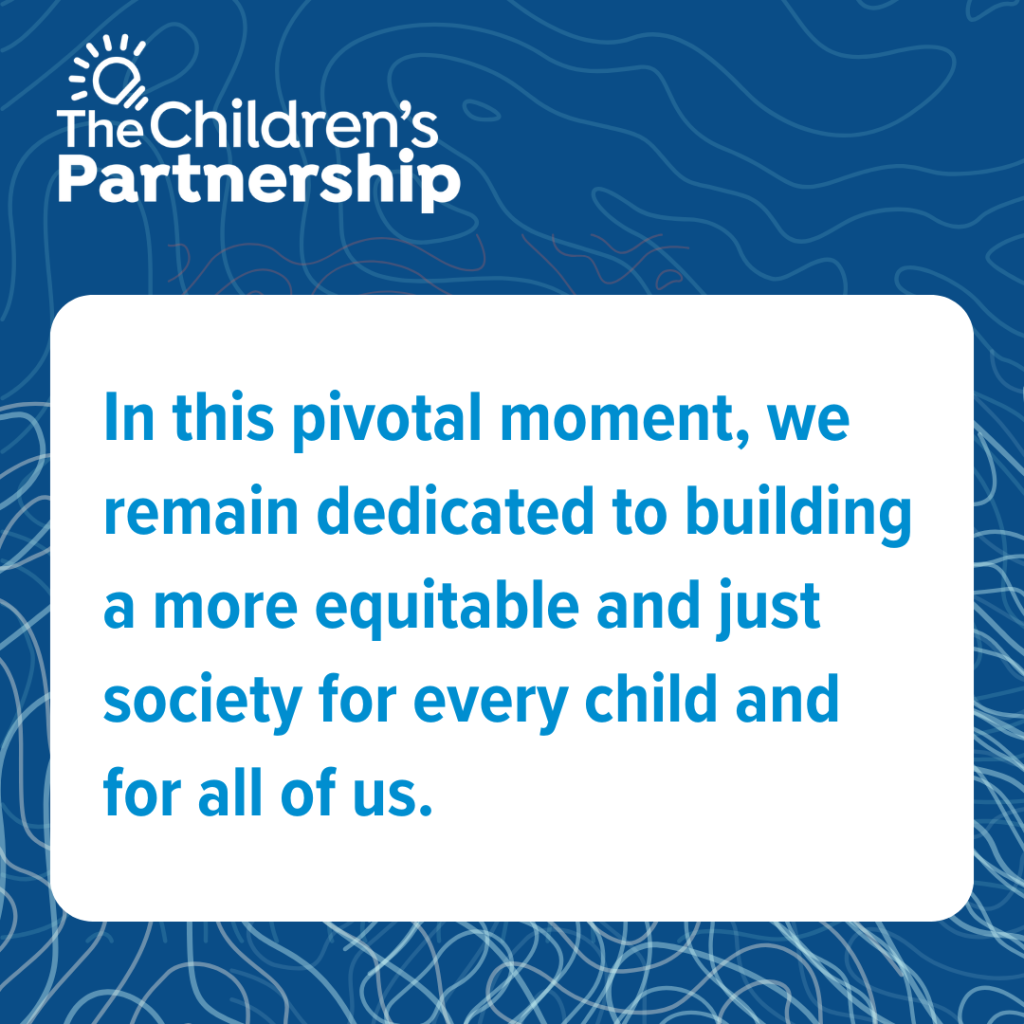
As we continue to reflect on the 2024 election results, The Children’s Partnership’s commitment to child health equity stands at the forefront. We are unwavering in our pursuit of justice and well-being for ALL children and youth in California, regardless of their race, ethnicity, place of birth, gender identity, sexual orientation or disability.
At the same time, we recognize that our communities of color and LGBTQ+ communities across California and the nation are resilient – and they’re tired. Our Black, Indigenous, Latine, Asian, Pacific Islander, transgender, queer, immigrant and other marginalized communities have been fighting against the systemic racism, ableism, sexism and homophobia this country was founded on for centuries, just to have a level playing field. And the fight goes on, with a second Trump presidency set to start in just a matter of months.
To our families and communities of all backgrounds: We hear you. We see you. We share your pain and frustration.
We, The Children’s Partnership team, are from many of these same communities. We are committed to the fight – today, tomorrow and always.
And as we approach Thanksgiving, we want to give thanks to all of you – our partners, supporters and friends – for the solidarity and partnership that will undoubtedly continue to fuel our shared work in the challenging times ahead.

Join Us on BlueSky
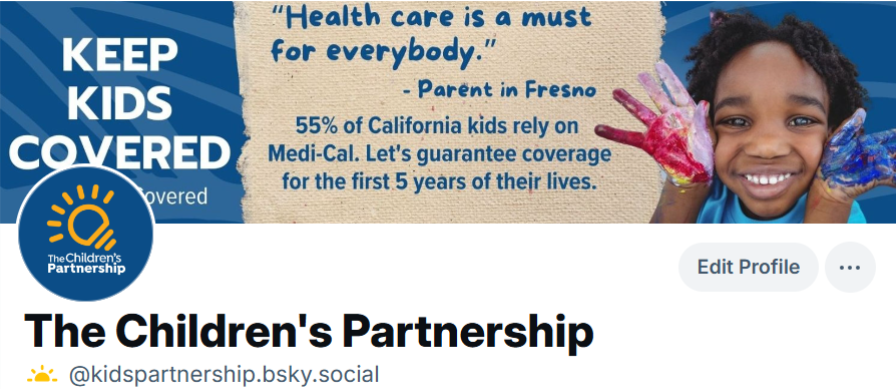
We’re excited to extend our advocacy for child health equity to the rapidly growing platform of BlueSky. We believe that the superior data transparency, ultra-detailed ways to control and cultivate the feed, and community guidelines that better align with our own ethics make BlueSky an obvious home for us and our partners to further our work.
Over the past week, Bluesky’s growth has exploded, more than doubling to more than 15 million users.
You can find us at @Kidspartnership.bsky.social. Say hi, and let us know if you’d like to be added to the California Child Health Equity starter kit that we’re building to give people a quick list of great organizations to follow!

New ‘A Child is a Child’ Fact Sheet: American Indian, Alaska Native and Indigenous Children’s Health
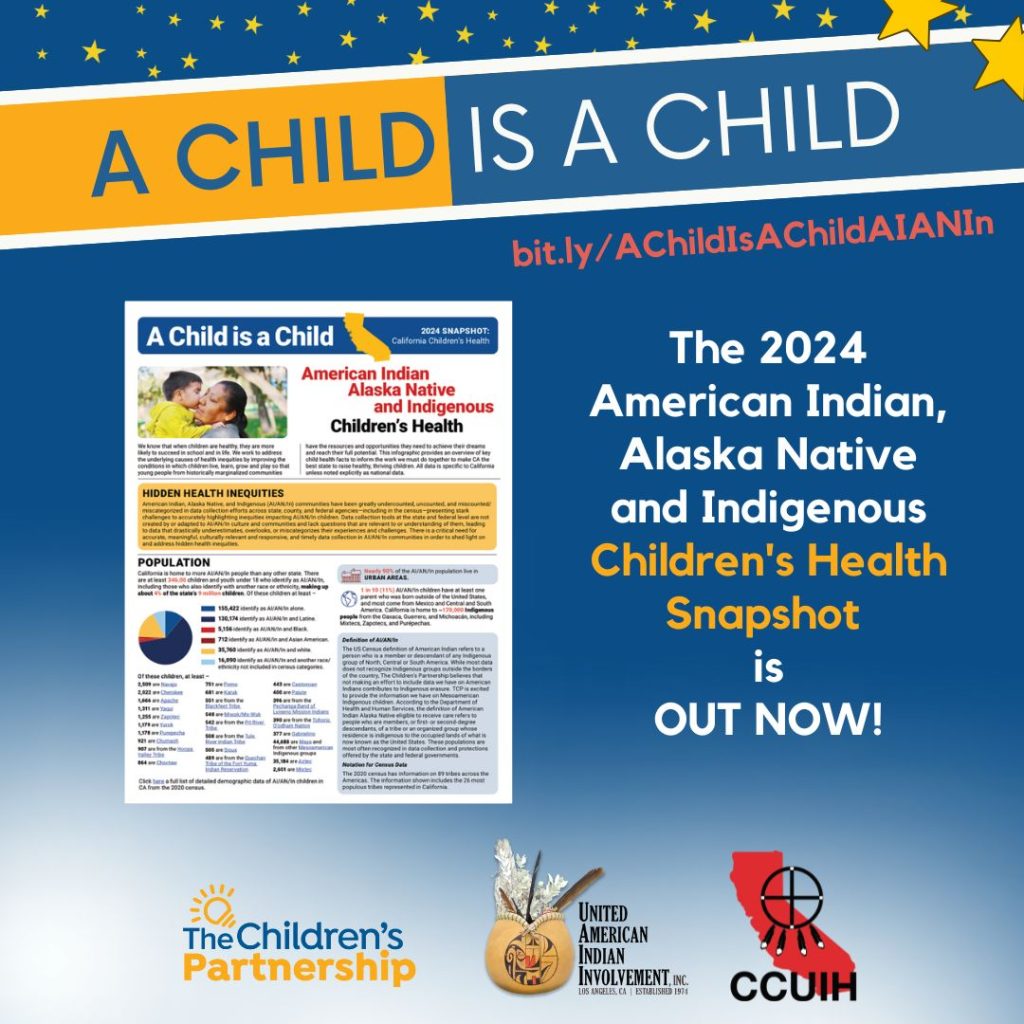
It’s Native American Heritage Month, and TCP is honoring the 346,000 American Indian, Alaska Native and Indigenous children in California by releasing a fact sheet highlighting the many factors that contribute to their health and well-being.
With our partners at the California Consortium for Urban Indian Health and United American Indian Involvement, Inc., we created this updated fact sheet in our “A Child is a Child” series with data and information on health care access and coverage, food insecurity, housing, digital equity, mental health, child welfare, educational success and safety, and more. We also highlight developments that contribute to protective factors, such as the passage of AB 81 and how Medi-Cal will cover some traditional healing practices, that help mitigate risks to and support American Indian, Alaska Native and Indigenous children’s healthy development.
We hope you find this fact sheet useful in your advocacy work. Please use and share the fact sheet and its accompanying social media toolkit to help spread the word!
New AB 665 Fact Sheet to Connect Youth to Mental Health Services
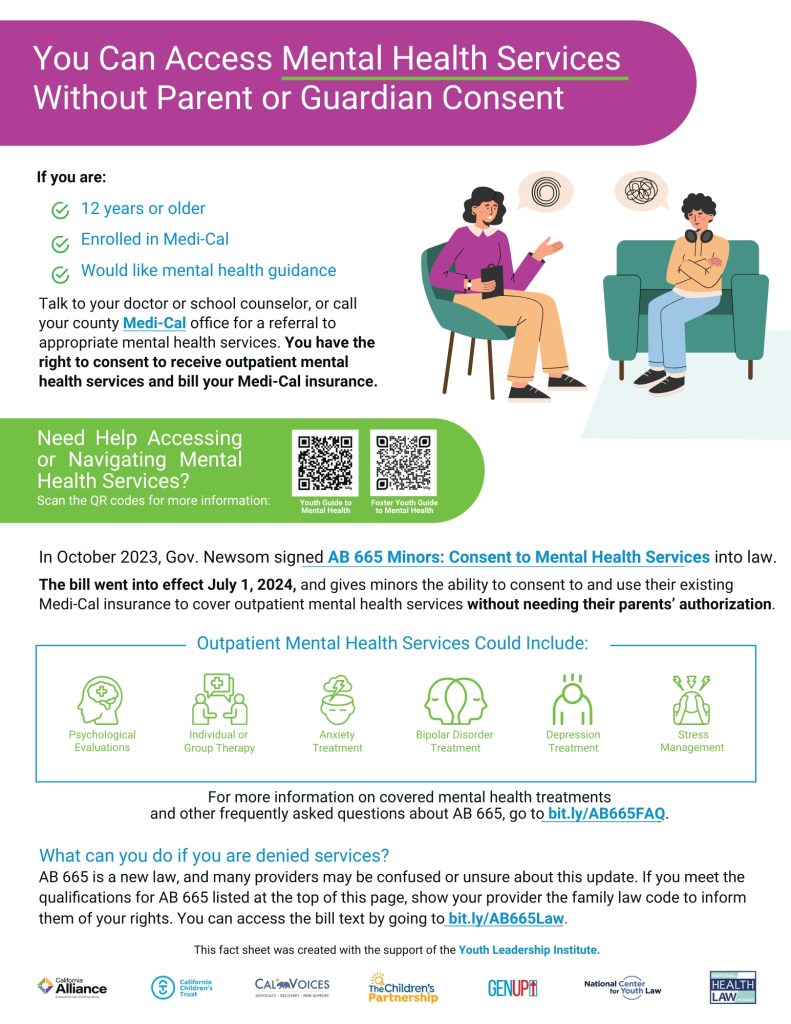
TCP has created a fact sheet to help youth 12 and older better understand their new right, established through AB 665, which allows them to consent to outpatient mental health services and bill their existing Medi-Cal insurance.
AB 665 was a bill created by youth and for youth to bridge a gap between Medi-Cal and privately insured youth in accessing minor consent mental health services. Minors’ right to consent to outpatient mental health care was established through a prior bill, SB 543. However, SB 543 created a higher standard of need for youth on Medi-Cal in order for the provider to bill Medi-Cal for mental health care services. This fundamentally unfair double standard meant that low-income youth were required to wait until they were experiencing a mental health crisis before they could receive confidential, Medi-Cal-covered care.
AB 665 changed that. Now minors have the ability to consent to and use their existing Medi-Cal insurance to cover outpatient mental health services without needing their parents’ authorization, just like privately insured youth.
This fact sheet offers:
- Guidance on accessing and navigating mental health services for youth on Medi-Cal
- A simple and easy-to-read explanation of AB 665: Mental Health Consent Parity for Medi-Cal Recipients
- Medi-Cal assistance
- Information on what youth can do if they are denied services
We invite any youth-serving organizations and providers to share this new resource. Help us get the word out to youth about AB 665 by sharing this fact sheet widely on social media, in your newsletter or with your networks!
DACA Recipients Now Eligible for Covered CA, Special Enrollment Period Happening Now
A recent federal rule change now allows recipients of DACA to sign up for an ACA health plan through Covered California starting November 1, 2024. Eligible DACA recipients can receive financial help if they qualify.
After the election results, some DACA recipients may wonder if they should still enroll in ACA coverage. TCP and our partners, including the National Immigration Law Center (NILC), encourage eligible DACA recipients to apply. Access to affordable, comprehensive health care under the ACA, including mental health, is more essential than ever. There is no policy change at this point, and any future changes are uncertain and would take significant time. It is important that we do not let fear or anxiety deter us from accessing the hard-fought health care we fought for. If you have concerns, see this NILC resource: Know Your Rights: Is It Safe to Apply for Health Insurance or Seek Health Care?
From now through December 31, 2024, DACA recipients can sign up for a health plan during a special enrollment period. Covered California has set up this special enrollment period to help DACA recipients get health insurance for the rest of the 2024 plan year. If you sign up in November, your plan could start as soon as December 1, 2024.
This special enrollment period overlaps with Covered California’s regular open enrollment period, meaning DACA recipients can also sign up for health insurance for 2025 during this time.
DACA ACA eligibility fact sheets: English and Spanish.
Read more on the Covered California website.
Mandatory Enrollment of Foster Children and Youth in Single Plan Counties
Beginning January 1, 2025, DHCS will mandatorily enroll current and former Foster Care children and youth in Single Plan Counties (Alameda, Contra Costa, and Imperial) who are currently in Fee-For-Service (FFS) Medi-Cal (Regular Medi-Cal) into a Medi-Cal health plan. FFS Medi-Cal will not be available in Single Plan Counties starting January 1, 2025. This will align policies in all Medi-Cal Managed Care Plan models where there is a Single Plan operating in the county, per Assembly Bill (AB) 118.
DHCS will mail member notices to current and former foster youth Medi-Cal members in Single Plan Counties 60 days and 30 days before January 1, 2025. All notices will include a web link and quick response code for members which includes more information about the transition to managed care and what it means for current and former foster children and youth in single plan counties.
Additional information and resources can be found at the Mandatory Enrollment for Foster Children and Youth in Single Plan Counties 2025 webpage.
California Children’s Services Due Process Toolkit
California Children’s Services (CCS) is a state program for children and youth with special health care needs. CCS can be a complex program to understand because the rules often depend on how the beneficiary gets CCS services and the county that the CCS beneficiary lives in. This CCS due process toolkit is intended to help CCS beneficiaries and their families navigate CCS program grievances and appeals. The toolkit provides guidance and best practices on the grievance and appeals process so that readers can understand how to get care through the CCS program. The guide includes the applicable laws, regulations, and policy guidance and flowcharts to help explain the process, as well as an index of acronyms referenced in the guide in Addendum A.
This toolkit was developed by the National Health Law Program in partnership with Disability Rights California.

Ballot Question Campaigns Come Up Short, But Work Continues on Medi-Cal Access and Housing Justice
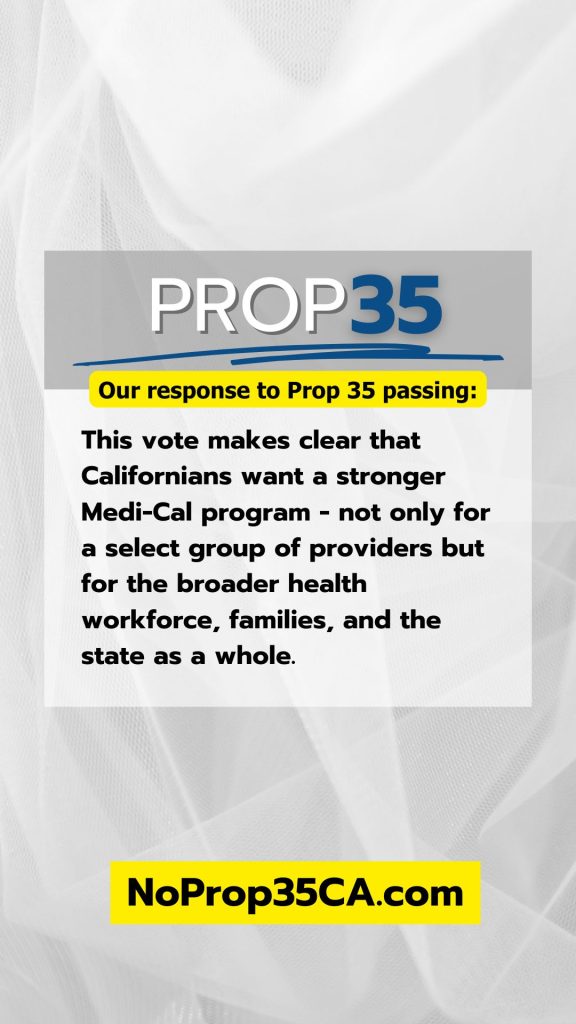
TCP actively supported three statewide ballot questions this November, but unfortunately, each came up short.
We are immensely proud of our grassroots campaign in opposition to Proposition 35, uniting communities across sectors and the state to protect Medi-Cal for the 1 in 3 Californians who depend on this vital program. Sharing the facts about this initiative and the stories of Medi-Cal patients, we earned the support of nearly every major newspaper editorial board in the state, dozens of voter guides, and organizations representing children, seniors, people with disabilities, advocates for democracy, and advocates for racial justice. The vote makes clear that Californians support the Medi-Cal program and want to improve access to health care.
While we opposed Prop 35 because of the details, state leaders now have a mandate to improve Medi-Cal. In the short term, state leaders must preserve the investments made in the 2024-25 budget, including continuous Medi-Cal coverage for young children and higher pay for community health workers. Read our No on Prop 35 coalition statement here.
TCP also supported Propositions 33 and 5. These measures would have provided local communities with stronger tools to address the housing affordability crisis, which disproportionately impacts children and families of color in California. While we are disappointed in the results, TCP’s commitment to housing justice is stronger than ever, and it will remain a top priority for us in 2025 to alleviate this significant barrier to health equity for California families.
Understanding California Birth Options Webinar Series
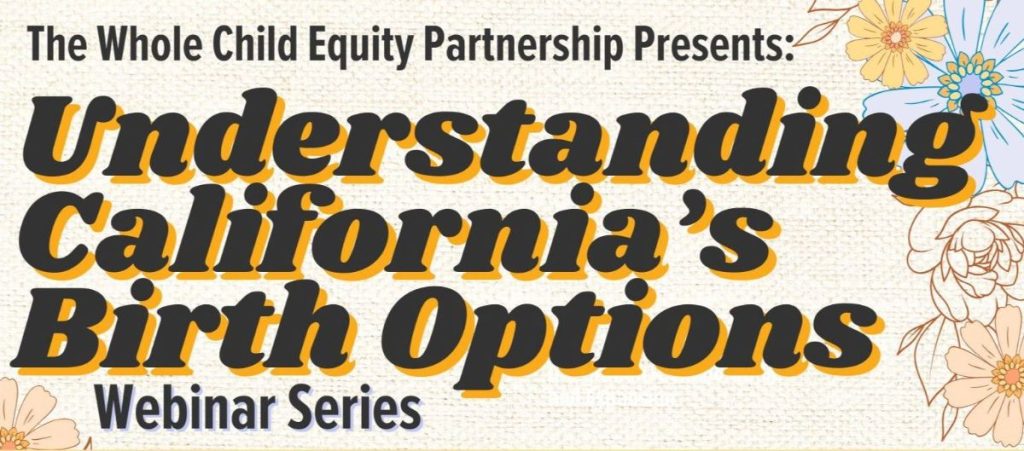
In California, Black women are four to six times more likely to die from pregnancy- or birth-related causes. Every birthing person deserves a safe, beautiful and dignified birth. The Whole Child Equity Partnership’s Health Workgroup put together a webinar series of conversations with doulas, community members and legal professionals to discuss California birth options because information is power.
California is currently experiencing a maternity care and maternal/infant mortality crisis. In this series, we clearly communicated the importance of the Midwifery Model of Care™, shared information on childbirth education options, informed decision-making and knowing your rights in a birth space setting – all in support of a safe and affirming childbirth experience for BIPOC families.
In Part 1: You Got Options, we discussed childbirth education modalities, local support and resources centering empowerment and perinatal wellness for BIPOC families, doula access, how to’s, and the advancement and advocacy of the Midwifery Model of Care™.
In Part 2: Envisioning Midwifery Integration, Collaboration and Expansion, we discussed the national maternal mortality/infant mortality crisis and its impacts here in California, birth disparities, the Midwifery Model of Care™, types of midwives licensed in California and their scope of practice, as well as the expansion, collaboration and integration of midwifery in California.
In Part 3: Know Your Rights, we discussed birthing rights in California, frequently asked questions related to birth justice, and overcoming barriers to birth equity for birthing families of color.
Proposition 1 Behavioral Health Services Act Webinar
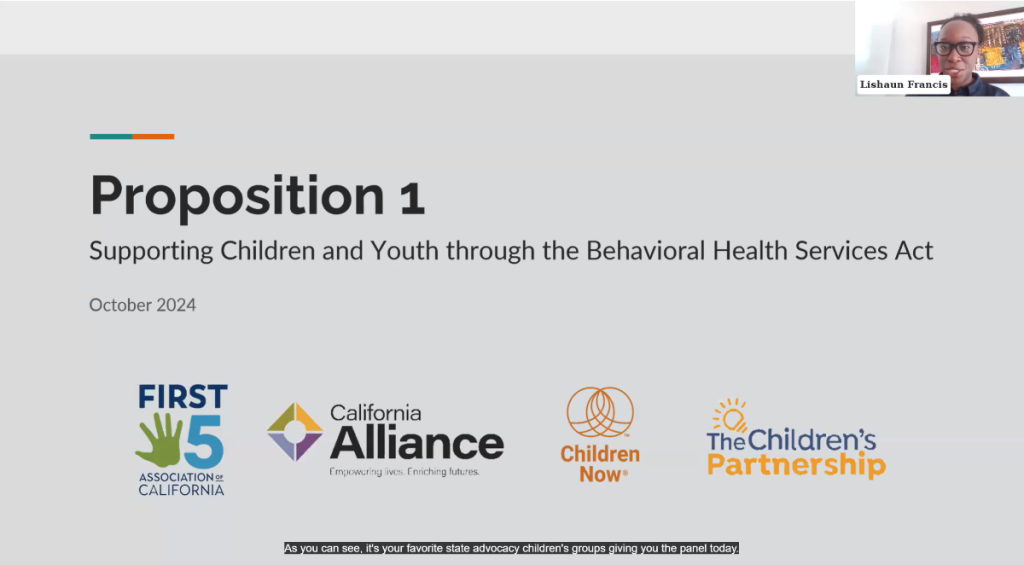
Angela Vazquez, TCP’s advocacy director for mental health, participated in the educational webinar, “The Behavioral Health Services Act: Proposition 1, Now What?” The webinar brought us together with Children Now, The California Alliance for Children and Family, and First 5 Association to explore how Prop 1 addresses behavioral health challenges and ensures the well-being of children and families in our state. The webinar provided insights into how Prop 1 will impact children and families across California, uplifted important outstanding questions, shared implementation efforts in-progress, and highlighted opportunities for engagement and joint advocacy to ensure equity-driven investments at the state and county level.

Somos Latine Families Virtual Conversation Series Returns
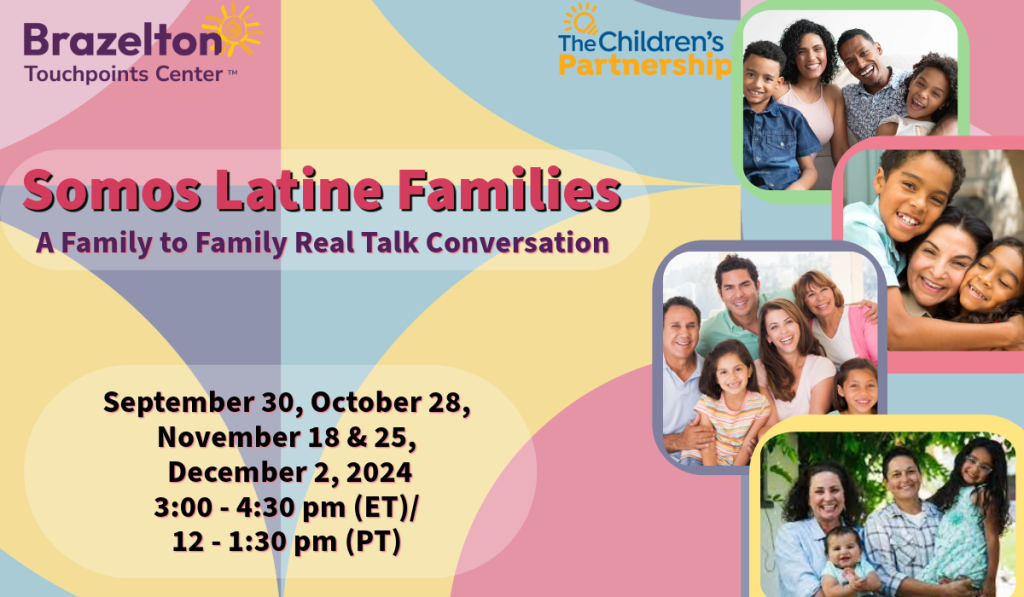
This free, 5-episode virtual conversation series offers a safe and welcoming space to hold conversations for and by Latine families. Explore what it means to be a parent as part of the Latine community, raising Latine children while navigating U.S. mainstream cultures, and connecting Latine cultural identities to physical and mental well-being.
Somos Latine Families is moderated by Eva Rivera, TCP advocacy director for early childhood development and Brazelton Touchpoints Center national facilitator.
Episode 4: Safe Spaces: Building Inclusive and Welcoming School Environments for Immigrant Families and Students
Every child deserves to learn in a safe, welcoming environment. Given the rise of harmful, anti-immigrant rhetoric, it is more important than ever that we strive to protect the rights and well-being of our immigrant students and families in schools. Join us for a discussion that explores the different ways parents can partner with school staff and community organizations to help create safe, inclusive spaces for all students.
Panelists: Eva Heredia and Lilian Ruiz, parent
Episode Details:
- Date: November 25, 2024
- Time: 12-1:30 p.m. PST
- Format: Each episode is 1 hour followed by a 30-minute Q&A session with parent panelists
Episode 5: Strengthening the Cultural Pride and Identity of Latine Children: The Role of Protective Factors in Latine Communities
Join us for a discussion on how protective factors strengthen cultural identity within our Latine communities. This episode will explore the roles of protective factors, such as multilingualism, biculturalism, familismo, personalismo and respeto in shaping resilient identities among Latine children, and how these cultural values contribute to the development of strong family bonds and individual identity. Embracing these protective factors is essential in building on families’ inherent strengths and continuing to foster a sense of belonging and pride.
2025 Insure the Uninsured Project’s Annual Conference

Join the Insure the Uninsured Project from February 3-4, 2025, for their 29th annual conference, Advancing Equity: Sustaining the Movement from Coverage to Access. The in-person conference will focus on California’s progress toward health equity, spotlighting groundbreaking strategies to bridge the gap between health coverage and quality access to care.
Faith Colburn, TCP’s advocacy director for health care, will be part of a panel discussion titled, “Ensuring Health Coverage for California’s Most Vulnerable Communities.”

TCP Research on Medi-Cal Call Wait Times, Focus Groups Featured
Turlock Journal and Stocktonia, through the Central Valley Journalism Collaborative, featured TCP research on Medi-Cal call wait times and Medi-Cal family focus groups. “It is absolutely not OK when a child who remains eligible for the program loses coverage because of administrative barriers, because their mother waited on the phone too long, or because they mailed an application and they didn’t make it, said Mayra Alvarez, president of the nonprofit The Children’s Partnership, a statewide advocacy group for children which has been tracking the unwinding period on California families. “Or because they moved apartments and didn’t get the right letter in the mail. Those are not reasons that a child, a family, should lose the security that comes with health insurance coverage.”
TCP’s Opposition to Prop 35 Cited
Los Angeles Times and CalMatters highlighted TCP’s opposition to Prop 35 in articles on November election results.
